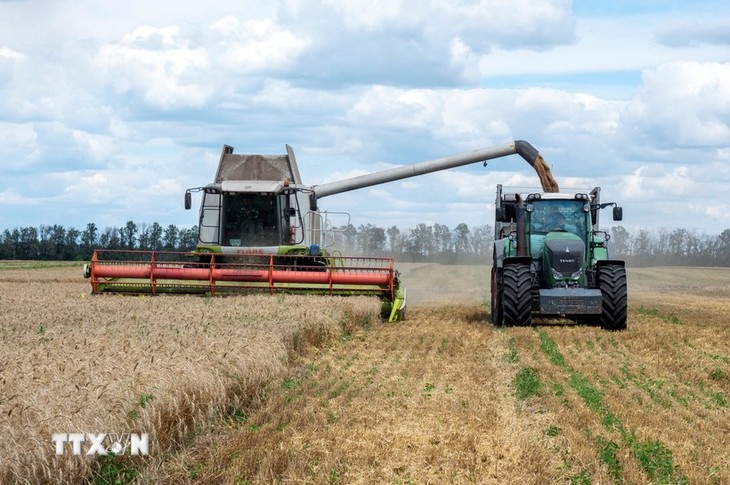(VOVWORLD) -The European Union has slashed some requirements for agriculture in face of large-scale protests by farmers since the beginning of the year as well as concerns about the impact on the European Parliament elections in June.
 (Illustrative photo: AFP/VNA) (Illustrative photo: AFP/VNA) |
The Agriculture Ministers of EU countries on Monday agreed to apply new import restrictions on agricultural products from Ukraine. This is the concession by the European Commission to pressure from farmers.
Agriculture is a priority
The restrictions are just one of many demands EU farmers have made to protect the EU’s agricultural sector. Other demands include loosening regulations and policies on the environment and climate change, which European farmers say harm the competitiveness of European agriculture.
On March 26, European farmers won their biggest victory since the protests began early this year, when the EC decided to ease environmental regulations in the Common Agricultural Policy, such as giving countries more flexibility in soil cover practices and exempting small farms under 10 hectares from checks and penalties for non-compliance with environmental requirements.
The EC has postponed the Nature Restoration Law, which set a target for the EU to restore at least 20% of its land and sea areas by 2030.
Anika Raisz, Hungary’s Minister of Agriculture, said: "Agricultural sector is a very important sector, not only in Hungary but everywhere in Europe. All the objectives that we’d like to reach in environmental protection have to be realistic. We have to keep in mind all the sectors and all the actors who help us to reach our objectives."
In addition to the EC's concessions, many EU countries have introduced their own new policies in response to the farmers’ demands. The French Senate at the end of March voted against the EU-Canada Free Trade Agreement on the grounds that its terms were unfavorable to French livestock farmers. On April 1 the French government suspended regulations requiring the reduction of pesticides in agriculture. Since January the government has increased financial subsidies for farmers, applied tax incentives and energy incentives, and increased subsidies for veterinary costs.
In Spain, Prime Minister Pedro Sanchez signed a new Food Chain Law in February, which will accelerate the implementation of a 4-billion-euro fund to help farmers, and promised to quickly disburse 6.8 billion euros to Spanish farmers from the Common Agricultural Policy. Italy, Portugal, Greece, Belgium, and Poland have rolled out similar financial support measures for farmers.
Elections
Farmers make up only 4.2% of the EU's workforce and the agricultural sector contributes just 1.4% of the EU's GDP. In theory farmers are not a force that can put much political pressure on European governments to make concessions.
However, according to Simone Tagliapietra, an expert at the Bruegel Research Foundation in Brussels, agriculture has an important traditional influence on European societies and has always been considered a part of the EU’s cultural identity. European people always support farmers. Statistics from Elabe in France show that 87% of the French support the farmers' protest movement. In Poland, the figure is about 80%.
The governments are concerned that the far-right and populist parties will take advantage of farmers' dissatisfaction to draw public support at the European Parliament elections to be held in June.
A report issued by the EU Committee of the Regions in March showed that support for far-right and populist parties tends to be much higher in rural areas than in other areas. Franc Bogovic, Slovakia's European Parliamentarian, warned that if the EC does not take urgent measures, this year's European elections will be "an election of angry farmers".
David Clarinval, the Minister of Agriculture of Belgium, the country that holds the rotating Presidency of the European Council, said: “It’s necessary to keep monitoring a number of specialized issues, including high input prices, extreme weather, and farmers’ low income. It’s important to take short- and long-term measures to push for a sustainable production model, enabling the European agricultural system to better withstand crises.”
Observers say that in the long term the biggest challenge for the EU is to balance between environmental ambitions, which have been considered the EC’s top priority in the current term, and the interests of the farmers. Environmental organizations have criticized the EC and EU countries’ concessions as a regression in the fight against climate change.
The next difficult problem for the EU will be the Anti-deforestation Law banning the import of products related to deforestation in other countries. It’s scheduled to take effect at the end of this year, but 20 of 27 EU countries have asked to postpone it.